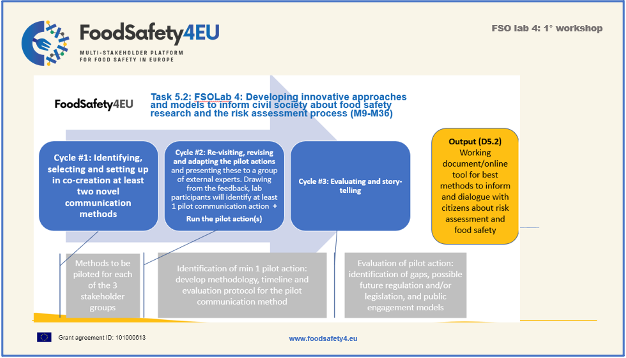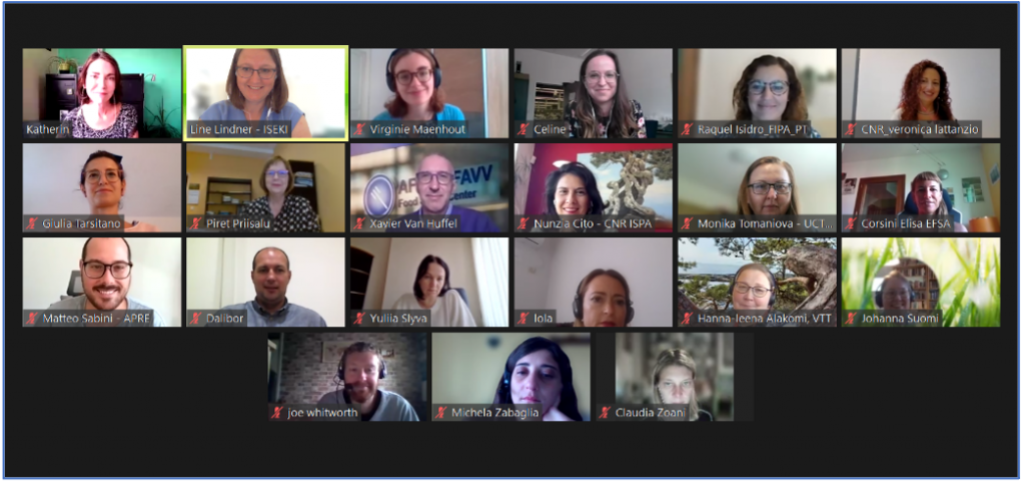From 14-15 September 2021, the first of three workshops within the Food Safety Operational Lab 4 (FSOLab 4) took place, involving 21 participants from 11 countries representing food safety authorities, industry/companies, research, civil society, and communication services.
FSOLab 4 is managed by Dr. Line Friis Lindner and the lab is facilitated by Dr. Katherine Flynn, both from ISEKI-Food Association.
The goal of FSOLab 4 is to engage actors from the food safety system in developing, implementing and evaluating innovative and novel communication methods informing civil society about food safety research and the risk assessment process.
Risk communication to civil society is important because foodborne incidents impact public health causing financial losses at the macro-, meso- and micro-level of society. Thus, effective risk communication – exchange of information between experts and civil society using appropriate communication techniques, formats and media – must enable people at risk to make informed decisions to protect themselves and the people near them. While most food safety communication methods are targeted at specific hazards, there are fewer examples informing civil society about the science-based risk assessment process. In FSOLab4, through stakeholder involvement and participatory workshops, lab participants will co-create food safety communication methods that will be implemented in practice.

As the other FSOLabs, FSOLab 4 is also built on the concept of the “Social lab” method involving social actors and addressing social challenges designed to bring together particular people and strengthen relationships to push forward innovative ideas. As such, social labs tackle social challenges in different fields, and they require the active engagement of all actors included and affected. And finally, social labs take as their point of departure real social challenges, the involved actors find solutions to these challenges and test the solutions in real-life environments eventually contributing to more sustainable embedding and uptake of the developed pilot ideas.

The first FSOLab4 workshop – 14-15 September 2021 – took place online and while many of the 21 lab participants had not met before, much of the time was dedicated to exchanging observations and viewpoints, engaging in dialogues and offering reflections (also in smaller groups). To foster a creative work process, we used (as the other FSOLabs) MIRO, which is an online collaborative whiteboard platform that works very well for teams to together visualize ideas and plan workflows. The level of engagement, commitment and interest in the topic and in the social lab process was very high from the beginning to the end. At the end of day 2, lab participants came to an agreement on 1 pilot idea and identified 3 pilot actions corresponding to three stakeholder groups.
Below, the goals of each of the sub-groups:
1 Pilot action – Sub-group Food Safety Authorities:
- make people aware of RA process in order to get their trust,
- draft the same key messages but in different formats according to the target groups
- include CAs or alternative entities as a multipliers
2 Pilot action – Sub-group Industry:
- increase awareness of SMEs and consumers of the risk assessment process, food production and food safety. Improvement of the industry brand.
- increase transparency and trust.
- promotion of the process and why this product is safer.
- integration of additional information to existing labels, e.g. traceability.
- education and awareness of the process and according to safety regulations/risk assessment.
3 Pilot action – Sub-group Consumers:
- raise awareness about the risk assessment process
- empower students as ambassadors (e.g. on social media, spreading the message with their parents and friends, etc.)
- make students more confident and responsible about their choices
Within each sub-group, a leader and co-leader were nominated as responsible for organizing the groups and for revising, re-visiting and adapting the 3 pilot actions to be presented to the FS4EU Advisory Board in October 2021. Based on the feedback from the Advisory Board, FSOLab 4 will, at the second workshop (8-9 November 2021), collectively evaluate the feedback and based on a common agreement in the lab, lab participants will then select at least one of the pilot actions to be tested in practice.
Thus, the work within FSOLab 4 remains exciting and we are all very much looking forward to taking part in the process of developing and implementing innovative and novel communication methods informing civil society about food safety research and the risk assessment process.
Line Friis Lindner, FSOLab4 Manager
ISEKI-Food Association